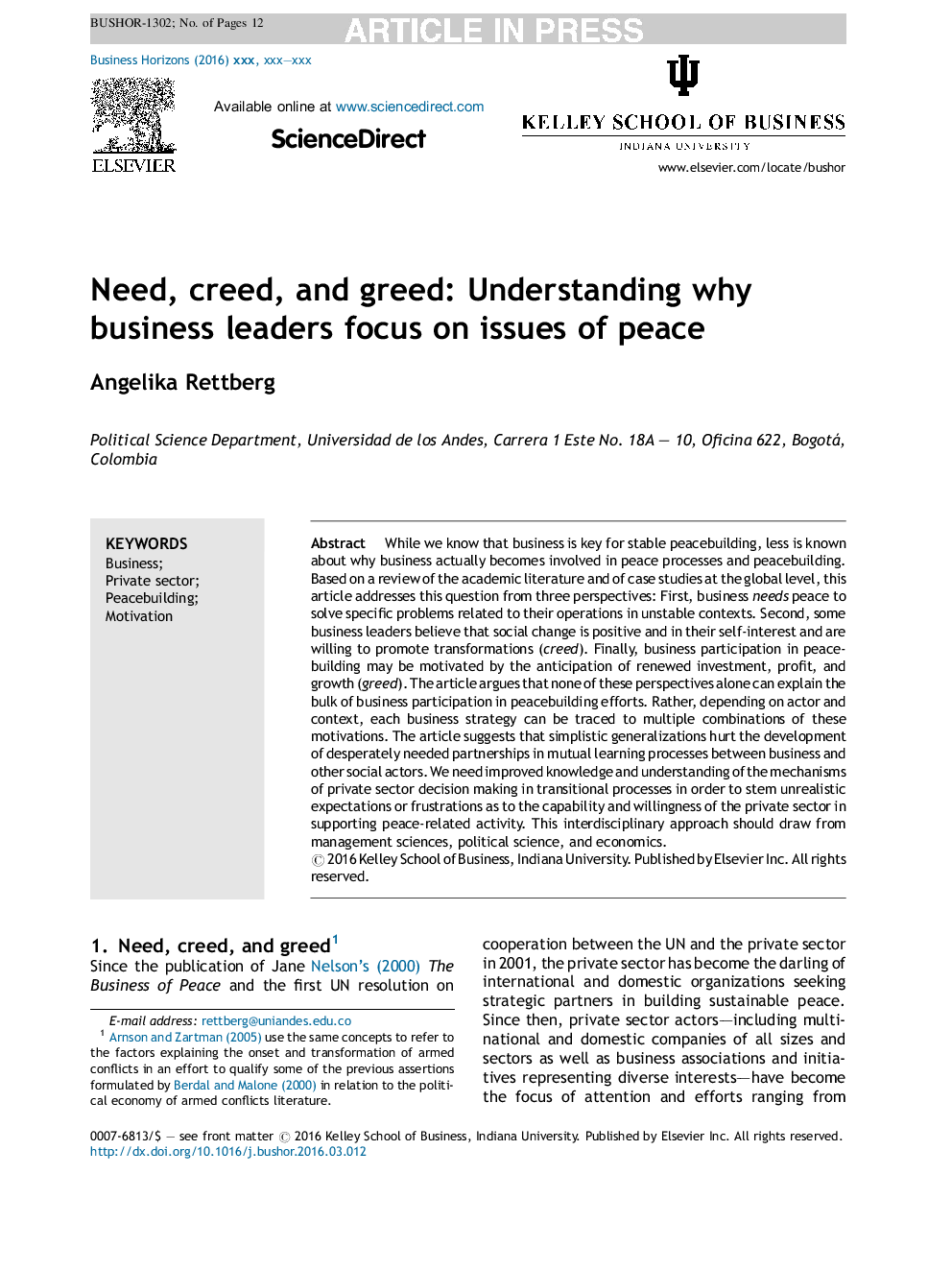| کد مقاله | کد نشریه | سال انتشار | مقاله انگلیسی | نسخه تمام متن |
|---|---|---|---|---|
| 5108927 | 1377676 | 2016 | 12 صفحه PDF | دانلود رایگان |
عنوان انگلیسی مقاله ISI
Need, creed, and greed: Understanding why business leaders focus on issues of peace
ترجمه فارسی عنوان
نیاز، اعتقاد و حرص و آز: درک اینکه چرا رهبران کسب و کار بر مسائل صلح تمرکز می کنند
دانلود مقاله + سفارش ترجمه
دانلود مقاله ISI انگلیسی
رایگان برای ایرانیان
کلمات کلیدی
کسب و کار، بخش خصوصی، صلح ساختن، انگیزه،
ترجمه چکیده
در حالی که ما می دانیم که کسب و کار برای ساخت و ساز پایدار پایدار است، کمتر در مورد اینکه چرا کسب و کار در واقع در روند صلح و ایجاد صلح دخیل است، کمتر شناخته شده است. بر اساس بررسی ادبیات علمی و مطالعات موردی در سطح جهانی، این مقاله این سوال را از سه دیدگاه مطرح می کند: اول، کسب و کار نیاز به صلح برای حل مشکلات خاص مربوط به عملیات خود را در زمینه های ناپایدار است. دوم، برخی از رهبران کسب و کار بر این باورند که تغییر اجتماعی مثبت و منافع شخصی خود هستند و مایل به ترویج تحولات (اعتقادات) هستند. در نهایت، پیش بینی سرمایه گذاری جدید، سود و رشد (حرص)، مشارکت کسب و کار در ایجاد صلح ممکن است. در این مقاله استدلال می شود که هیچ یک از این دیدگاه ها تنها نمی توانند بخش عمده ای از مشارکت تجاری را در تلاش های صلح آمیز توضیح دهند. در عوض، بسته به نوع بازیگری و زمینه، هر استراتژی کسب و کار میتواند به ترکیب چندین انگیزه پی ببرد. این مقاله نشان می دهد که تعمیم های ساده به توسعه مشارکت ناچیز ضروری در فرایندهای یادگیری متقابل بین کسب و کار و دیگر بازیگران اجتماعی آسیب می رسانند. ما نیاز به پیشرفت دانش و درک مکانیسم تصمیم گیری بخش خصوصی در فرایندهای انتقالی به منظور جلوگیری از انتظارات غلط و یا ناامیدی در مورد توانایی و تمایل بخش خصوصی در حمایت از فعالیت های مرتبط با صلح. این رویکرد میان رشته ای باید از علوم مدیریتی، علوم سیاسی و اقتصاد باشد.
موضوعات مرتبط
علوم انسانی و اجتماعی
مدیریت، کسب و کار و حسابداری
کسب و کار و مدیریت بین المللی
چکیده انگلیسی
While we know that business is key for stable peacebuilding, less is known about why business actually becomes involved in peace processes and peacebuilding. Based on a review of the academic literature and of case studies at the global level, this article addresses this question from three perspectives: First, business needs peace to solve specific problems related to their operations in unstable contexts. Second, some business leaders believe that social change is positive and in their self-interest and are willing to promote transformations (creed). Finally, business participation in peacebuilding may be motivated by the anticipation of renewed investment, profit, and growth (greed). The article argues that none of these perspectives alone can explain the bulk of business participation in peacebuilding efforts. Rather, depending on actor and context, each business strategy can be traced to multiple combinations of these motivations. The article suggests that simplistic generalizations hurt the development of desperately needed partnerships in mutual learning processes between business and other social actors. We need improved knowledge and understanding of the mechanisms of private sector decision making in transitional processes in order to stem unrealistic expectations or frustrations as to the capability and willingness of the private sector in supporting peace-related activity. This interdisciplinary approach should draw from management sciences, political science, and economics.
ناشر
Database: Elsevier - ScienceDirect (ساینس دایرکت)
Journal: Business Horizons - Volume 59, Issue 5, SeptemberâOctober 2016, Pages 481-492
Journal: Business Horizons - Volume 59, Issue 5, SeptemberâOctober 2016, Pages 481-492
نویسندگان
Angelika Rettberg,
